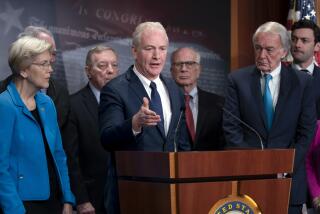Administration Assessing Hard Lessons of Somalia : Military: Clinton about to approve new list of rules designed to minimize U.S. risk in forays into peacekeeping.
- Share via
WASHINGTON — As the last U.S. troops leave Mogadishu today, the Clinton Administration is still absorbing the hard lessons of its bitter experience in Somalia--and still trying to persuade a skeptical Congress that the United States should play a major role in international peacekeeping.
Despite the bloody nose he got in Somalia, President Clinton has not abandoned the idea of sending U.S. troops to police trouble spots overseas. Instead, he is about to approve a new list of rules designed to make U.S. forays into peacekeeping as low-risk as possible.
“Peacekeeping . . . is rooted in American interests,” Clinton’s national security adviser, Anthony Lake, said in an interview Thursday.
The most important lesson of Somalia, said Lake, is not that the United States should refuse to intervene in foreign conflicts--but that the Administration should set clear and achievable goals, state them clearly to Congress and the public and know how to get out if things go wrong.
The new guidelines, contained in a document called “Presidential Decision Directive 13,” are likely to face an early test as diplomats work toward a settlement in Bosnia-Herzegovina that could require as many as 25,000 U.S. ground troops to serve as peacekeepers.
How the Administration will act when it faces that moment in Bosnia still is uncertain. “In Somalia, this Administration encountered a firestorm--and it’s still feeling burned,” said Arnold Kanter, an undersecretary of state in the George Bush Administration.
But Lake and other officials said there is more public support for U.N. peacekeeping operations than many members of Congress realize. Inside the White House, Lake has been talking up a University of Maryland poll that shows a surprisingly large 49% supporting U.S. participation in most U.N. forces--and another 42% supporting it in cases where U.S. interests are directly involved.
In Bosnia, Lake said, “I think it would still require a real effort to convince many members of Congress but . . . I can sense a real openness to the arguments that was not there” last year.
William J. Durch, a strategist at Washington’s Henry L. Stimson Center, a defense-oriented research organization, agreed.
“I don’t know that (Somalia) soured us on peacekeeping as much as it sobered us,” he said.
Among Directive 13’s provisions:
* U.S. troops will only participate in U.N. peacekeeping operations in cases where there is a serious threat or breach of international security. Even then, the deployment must serve U.S. national interests. And all warring factions must have signed a peace accord.
* The troops must be part of a multinational force, with a deployment order that provides a clear view of what the objectives of the mission are, how long it will last and what criteria the Administration will use to decide when to bring its forces home.
* U.S. peacekeeping troops normally will serve in jobs for which Americans have special qualifications--providing air power or operating high-tech radar and communications equipment, for example--rather than front-line ground patrols, which might be riskier.
* Except for a few limited circumstances, all U.S. forces will be under U.S. command--not under the command of foreign generals or admirals.
* The Administration will work now more closely with Congress on peacekeeping operations, notifying lawmakers before deploying U.S. troops in the first place and keeping key House and Senate committees up to date on how the venture is going.
The limits contained in the directive constitute a conspicuous retreat from the dream that the Administration had only a year ago for a permanent, U.N.-led multilateral rapid-reaction force to keep the peace and support “nation-building” in the post-Cold War world.
More to Read
Get the L.A. Times Politics newsletter
Deeply reported insights into legislation, politics and policy from Sacramento, Washington and beyond. In your inbox twice per week.
You may occasionally receive promotional content from the Los Angeles Times.











